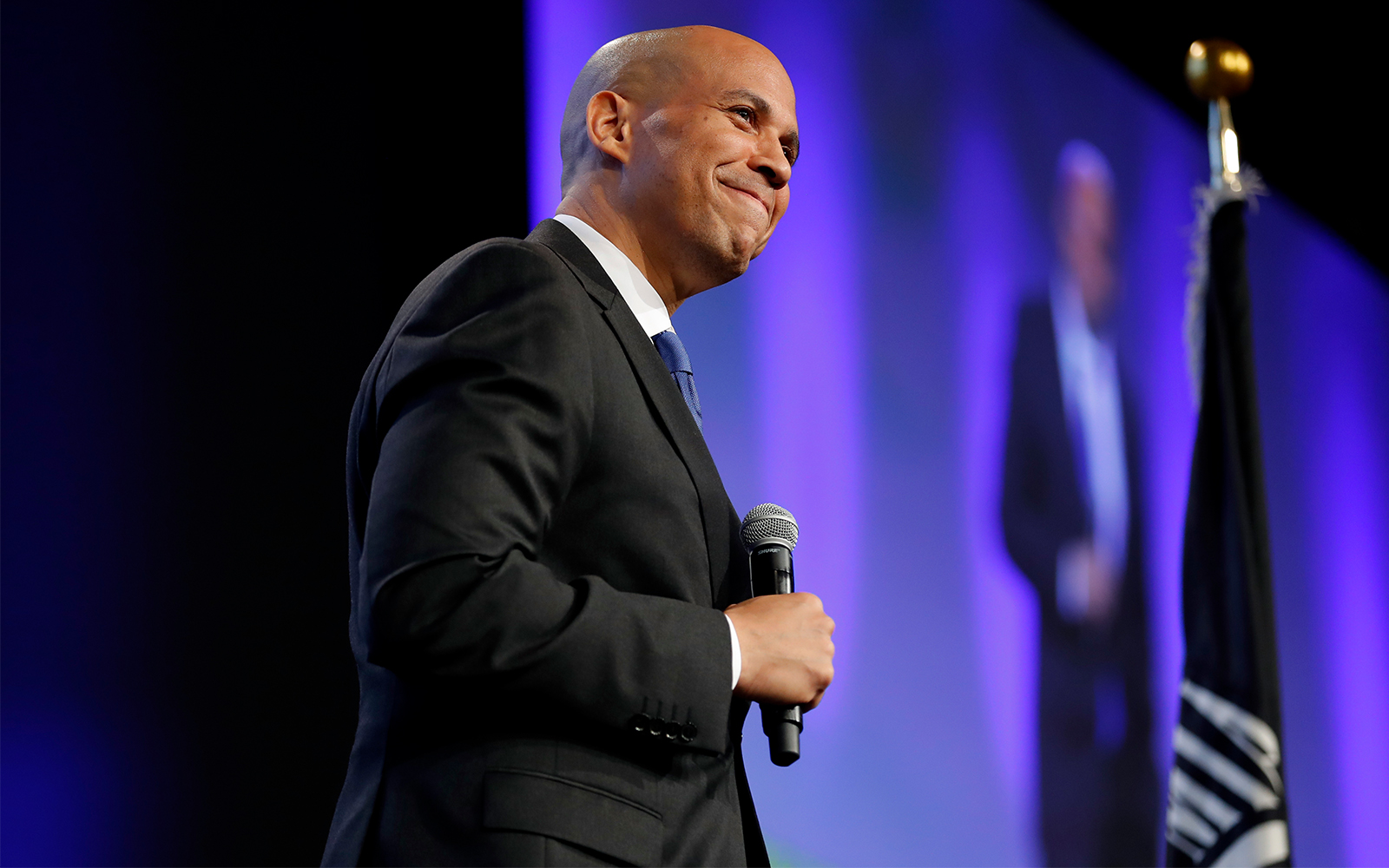New year, and a new reason for some candidates to call it quits. First, it was Julian Castro back on Jan. 2, then it was Marianne Williamson earlier this week. Now, New Jersey Sen. Cory Booker is the latest to pull the plug on a presidential campaign just a day before the first primary debate of 2020, which Booker would not have been a part of.
Booker, it’s worth noting, was the remaining African-American candidate with any real polling support in the Democratic primary. Yes, former Massachusetts Gov. Deval Patrick is still in, but nobody is paying attention to him. Booker’s departure, meanwhile, fuels an already lingering line of criticism over the increasing lack of diversity in what started out as a historically diverse primary field.
Booker dropped the news Monday morning via his Twitter account:
It’s with a full heart that I share this news—I’m suspending my campaign for president.
To my team, supporters, and everyone who gave me a shot—thank you. I am so proud of what we built, and I feel nothing but faith in what we can accomplish together. pic.twitter.com/Fxvc549vlJ
— Cory Booker (@CoryBooker) January 13, 2020
Missing the January debate, after also failing to make it in December, seemed to be the last straw for Booker who was already grumbling last month that he wouldn’t be able to continue much further without increased support:
Booker held a staff call at his campaign headquarters in Newark before making his announcement public, a campaign official told NBC News.
Booker polled at about 2 percent nationally, according to the RealClearPolitics polling average, and was knocked off the debate stage in recent months. Booker joins author Marianne Williamson and former Housing Secretary Julián Castro as candidates who have departed from the race this month.
Earlier this month, Booker said the president’s looming impeachment trial, in addition to other matters in Washington, D.C., could deal a “big, big blow” to his presidential aspirations. In September, his campaign made a plea to supporters for donations, saying if Booker did not quickly raise nearly $2 million, his campaign would have no path forward.
Booker is the most recent candidate to exit the race while still holding on to a measurable amount of support. While his numbers weren’t enough to earn him a debate spot, but he was still grabbing almost 3% in Iowa according to the RealClearPolitics average. Nationally, he was having trouble cracking 2%, but his name remained in the conversation.
At this point, with more minority candidates leaving the race, the DNC can do less and less, if it wanted to, in ensuring a diverse representation of candidate backgrounds on the debate stage. As it stands now, several media outlets were already taking notice:
Only white candidates have qualified for next week’s Democratic presidential debate, the first time in this election cycle that no minority contender will make the stage. It’s a dynamic that critics say threatens to undercut the party’s rhetoric of inclusivity.
The race for the 2020 Democratic nomination kicked off last year with a historically diverse pool of candidates, including two black senators, a black mayor, a Hispanic former Cabinet secretary and an Asian businessman. Since then, all have either dropped out or failed to qualify for a spot on the stage, determined by poll numbers and donations.
Now the specter of an all-white debate in the mostly white state of Iowa is prompting concern among party activists.
Really, though, what is the DNC supposed to do at this point? By changing the rules to allow more candidates in, the message would be a tacit endorsement of the criticism that the rules, by their nature, were racially tinged somehow. Booker, in his criticism of the debate rules, has tried to avoid calling voters “racist,” but when the measurements are based on polls and fundraising, numbers which rely on response and interest from actual voters, that’s basically what his criticisms boil down to.
Days ago, Elizabeth Warren voiced the same concerns:
Democratic presidential candidate Sen. Elizabeth Warren warns that her party has “a problem” when it comes to a lack of diverse candidates making the presidential primary debate stage.
All of the candidates are Caucasian and for the first time, no non-white candidate will qualify for the debate. Tech entrepreneur Andrew Yang – who’s Asian-American – and Sen. Cory Booker of New Jersey – who’s black – were on the bubble, but as of Friday were unlikely to reach the DNC’s thresholds.
“We started out with such an importantly diverse field, a field that had lots of different voices, lots of different perspectives. For me the particularly hard day was the day that (Sen.) Kamala Harris … was dropping out of the race because of money and that same day a billionaire bought his way onto the debate stage. Now that’s just not right.”
Warren’s billionaire jab was directed at Steyer, who’s qualified for the past three debates.
Steyer has played by the rules set forth by the DNC last year. He has met all their requirements and earned a couple of debate spots so far despite having never held public office. Warren may not like the rules any more than Booker does, at this point, but they’re the rules every campaign agreed to. On the surface, it seems simple enough, measure the field by polls and fundraising. In this case, however, the rules appear to be biased in favor of candidates with plenty of free-flowing personal wealth to bankroll advertising.
Either way, the debate on Tuesday will have just 6 candidates and lack diversity beyond a mix of genders. Booker’s departure will likely come up as a point of discussion where it’s possible some candidates could lash out on stage at the DNC, as Tulsi Gabbard famously did a few debates back over her treatment as a candidate.
Donate Now to Support Election Central
- Help defend independent journalism
- Directly support this website and our efforts
